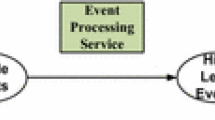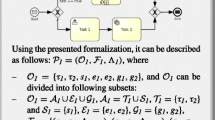Abstract
Event-Condition-Action (ECA) rules offer a flexible, adaptive, and modular approach to realizing business processes. This article discusses the use of ECA rules for describing business processes in an executable manner. It investigates the benefits one hopes to derive from using ECA rules and presents the challenges in realizing business processes. These constitute a list of requirements for an (executable) business process description language, and we take them as a basis to investigate suitability of the concrete ECA rule language XChange in realizing a business process from the EU-Rent Case Study.
Preview
Unable to display preview. Download preview PDF.
Similar content being viewed by others
References
Davenport, T.H.: Process Innovation: Reengineering Work through Information Technology. Havard Business School Press, Boston (1993)
The Business Rules Group: Defining business rules – what are they really? (2000), available at: www.businessrulesgroup.org
World Wide Web Consortium: Rule interchange format working group charter (2005), See: www.w3.org/2005/rules/wg/charter
Bonatti, P.A., Olmedilla, D.: Driving and monitoring provisional trust negotiation with metapolicies. In: IEEE Int. Workshop on Policies for Distributed Systems and Networks. IEEE Comp. Soc., Los Alamitos (2005)
Bry, F., Schwertel, U.: REWERSE – reasoning on the Web. AgentLink News (15) (2004)
Andrews, T., et al.: Business process execution language for web services version 1.1 (2003), available at: www.ibm.com/developerworks/library/ws-bpel
Carter, B.M., Lin, J.Y.C., Orlowska, M.E.: Customizing internal activity behaviour for flexible process enforcement. In: Proc. Australasian Database Conference. Australian Computer Society (2004)
van der Aalst, W.M.P., ter Hofstede, A.H.M., Kiepuszewski, B., Barros, A.P.: Workflow patterns. Distributed and Parallel Databases 14(1) (2003)
White, S.A.: Introduction to BPMN. Technical report, Object Management Group (OMG) (2004), available at: http://www.bpmn.org
Hall, J.: Business rules boot camp. Tutorial at the European Business Rules Conference (2005)
Wagner, G.: How to design a general rule markup language? In: Proc. Workshop on XML Technologien für das Semantic Web - XSW, LNI, GI, vol. 14 (2002)
Bry, F., Marchiori, M.: Ten theses on logic languages for the Semantic Web. In: Fages, F., Soliman, S. (eds.) PPSWR 2005. LNCS, vol. 3703, pp. 42–49. Springer, Heidelberg (2005)
EU-Rent Case Study (2005), http://www.eurobizrules.org/ebrc2005/eurentcs/eurent.htm
European Business Rules Conference (2005), http://www.eurobizrules.org
Business Rules Group (2005), http://www.businessrulesgroup.org
Gudgin, M., et al.: SOAP version 1.2. W3C recommendation, World Wide Web Consortium (2003)
Schaffert, S., Bry, F.: Querying the Web reconsidered: A practical introduction to Xcerpt. In: Proc.Extreme Markup Languages (2004)
Bailey, J., Bry, F., Eckert, M., Pătrânjan, P.L.: Flavours of XChange, a rule-based reactive language for the (Semantic) Web. In: Adi, A., Stoutenburg, S., Tabet, S. (eds.) RuleML 2005. LNCS, vol. 3791, pp. 187–192. Springer, Heidelberg (2005)
Bry, F., Eckert, M., Pătrânjan, P.L.: Reactivity on the Web: Paradigms and applications of the language XChange. J. of Web Engineering 5(1), 3–24 (2006)
Knolmayer, G., Endl, R., Pfahrer, M.: Modeling processes and workflows by business rules. In: van der Aalst, W.M.P., Desel, J., Oberweis, A. (eds.) Business Process Management. LNCS, vol. 1806, p. 16. Springer, Heidelberg (2000)
Bry, F., Eckert, M.: Twelve theses on reactive rules for the Web. In: Proc. Workshop Reactivity on the Web at Int. Conf. on Extending Database Technology. LNCS, vol. 3268. Springer, Heidelberg (2006)
Brambilla, M., Ceri, S., Comai, S., Tziviskou, C.: Exception handling in workflow-driven web applications. In: Proc. Int. Conference on World Wide Web. ACM, New York (2005)
Author information
Authors and Affiliations
Editor information
Editors and Affiliations
Rights and permissions
Copyright information
© 2006 Springer-Verlag Berlin Heidelberg
About this paper
Cite this paper
Bry, F., Eckert, M., Pătrânjan, PL., Romanenko, I. (2006). Realizing Business Processes with ECA Rules: Benefits, Challenges, Limits. In: Alferes, J.J., Bailey, J., May, W., Schwertel, U. (eds) Principles and Practice of Semantic Web Reasoning. PPSWR 2006. Lecture Notes in Computer Science, vol 4187. Springer, Berlin, Heidelberg. https://doi.org/10.1007/11853107_4
Download citation
DOI: https://doi.org/10.1007/11853107_4
Publisher Name: Springer, Berlin, Heidelberg
Print ISBN: 978-3-540-39586-7
Online ISBN: 978-3-540-39587-4
eBook Packages: Computer ScienceComputer Science (R0)




